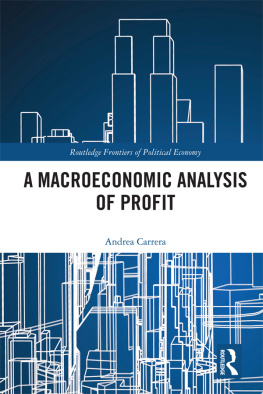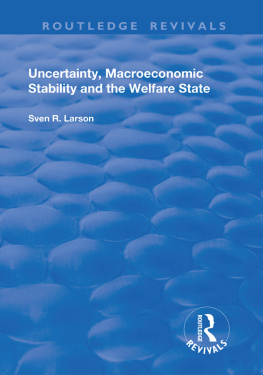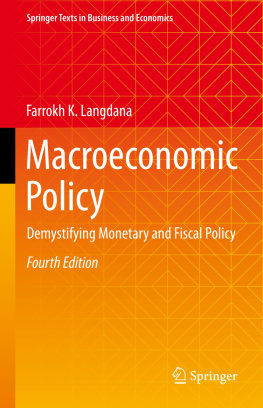Carrera - A macroeconomic analysis of profit
Here you can read online Carrera - A macroeconomic analysis of profit full text of the book (entire story) in english for free. Download pdf and epub, get meaning, cover and reviews about this ebook. year: 2019, publisher: Routledge, genre: Romance novel. Description of the work, (preface) as well as reviews are available. Best literature library LitArk.com created for fans of good reading and offers a wide selection of genres:
Romance novel
Science fiction
Adventure
Detective
Science
History
Home and family
Prose
Art
Politics
Computer
Non-fiction
Religion
Business
Children
Humor
Choose a favorite category and find really read worthwhile books. Enjoy immersion in the world of imagination, feel the emotions of the characters or learn something new for yourself, make an fascinating discovery.
- Book:A macroeconomic analysis of profit
- Author:
- Publisher:Routledge
- Genre:
- Year:2019
- Rating:4 / 5
- Favourites:Add to favourites
- Your mark:
- 80
- 1
- 2
- 3
- 4
- 5
A macroeconomic analysis of profit: summary, description and annotation
We offer to read an annotation, description, summary or preface (depends on what the author of the book "A macroeconomic analysis of profit" wrote himself). If you haven't found the necessary information about the book — write in the comments, we will try to find it.
Carrera: author's other books
Who wrote A macroeconomic analysis of profit? Find out the surname, the name of the author of the book and a list of all author's works by series.
A macroeconomic analysis of profit — read online for free the complete book (whole text) full work
Below is the text of the book, divided by pages. System saving the place of the last page read, allows you to conveniently read the book "A macroeconomic analysis of profit" online for free, without having to search again every time where you left off. Put a bookmark, and you can go to the page where you finished reading at any time.
Font size:
Interval:
Bookmark:

Based on the observation of economic reality, this book provides for the foundations of a new structure of national payment systems. Specifically, to this end, a rigorous accounting for money transactions, savings, and invested profit is suggested, with a major aim to settle sustainable lending levels.
Profit lies at the heart of economic activities. Indeed, companies, from small to large, seek net gains to remunerate shareholders and to increase their assets. Yet, economists are far from sharing a common theory of profit. Using mathematical tools and a discursive approach, this book contributes to the debates in such regard, in the attempt to provide new answers to old economic issues. What is macroeconomic profit? Is there any relationship between wages, lending, and profit?
This book is an accessible resource for economists and financial experts as well as global economics students, researchers, academics, and historians alike. It will challenge policy-makers and professionals and lead them on a thought-provoking journey through the realm of macroeconomics.
Andrea Carrera is Professor of Economics at Schiller International University, Madrid campus, Spain. He has gained academic and business experience in both Europe and North America. He has lectured on and authored a number of scientific articles in economics, and he has worked for large and medium-sized companies. Andrea holds a PhD (Switzerland) and an MPhil (Spain) in economics. He loves 20th-century history, languages, food, and hiking with good friends.
Economics for an Information Age
Money-Bargaining, Support-Bargaining and the Information Interface
Patrick Spread
The Pedagogy of Economic, Political and Social Crises
Dynamics, Construals and Lessons
Edited by Bob Jessop and Karim Knio
Commodity
The Global Commodity System in the 21st Century
Photis Lysandrou
Uncertainty and Economics
A Paradigmatic Perspective
Christian Mller-Kademann
Discourse Analysis and Austerity
Critical Studies from Economics and Linguistics
Edited by Kate Power, Tanweer Ali and Eva Lebdukov
The Dark Places of Business Enterprise
Reinstating Social Costs in Institutional Economics
Pietro Frigato and Francisco J. Santos Arteaga
Economic Woman
Gendering Economic Inequality in the Age of Capital
Frances Raday
A Macroeconomic Analysis of Profit
Andrea Carrera
For more information about this series, please visit: www.routledge.com/books/series/SE0345

First published 2019
by Routledge
2 Park Square, Milton Park, Abingdon, Oxon OX14 4RN
and by Routledge
52 Vanderbilt Avenue, New York, NY 10017
Routledge is an imprint of the Taylor & Francis Group, an informa business
2019 Andrea Carrera
The right of Andrea Carrera to be identified as author of this work has been asserted by him in accordance with sections 77 and 78 of the Copyright, Designs and Patents Act 1988.
All rights reserved. No part of this book may be reprinted or reproduced or utilised in any form or by any electronic, mechanical, or other means, now known or hereafter invented, including photocopying and recording, or in any information storage or retrieval system, without permission in writing from the publishers.
Trademark notice: Product or corporate names may be trademarks or registered trademarks, and are used only for identification and explanation without intent to infringe.
British Library Cataloguing-in-Publication Data
A catalogue record for this book is available from the British Library
Library of Congress Cataloging-in-Publication Data
Names: Carrera, Andrea, 1986 author.
Title: A macroeconomic analysis of profit/Andrea Carrera.
Description: 1 Edition. | New York, NY : Routledge, 2019. | Includes bibliographical references and index.
Identifiers: LCCN 2018058380 (print) | LCCN 2018060582 (ebook) | ISBN 9781351213356 (eBook) | ISBN 9780815380351 (hardback : alk. paper) | ISBN 9781351213356 (ebk)
Subjects: LCSH: Profit. | Wages. | Loans. | Banks and banking.
Classification: LCC HB601 (ebook) | LCC HB601. C327 2019 (print) | DDC 338.5/16dc23
LC record available at https://lccn.loc.gov/2018058380
ISBN: 978-0-8153-8035-1 (hbk)
ISBN: 978-1-351-21335-6 (ebk)
Typeset in Sabon
by Apex CoVantage, LLC
ALVARO CENCINI AND SERGIO ROSSI
ANDREA CARRERA
The existence of profits is a fact nobody can deny. Yet, economists search for a satisfactory theory of profits has been going on for a long time, and it is only recently that a full explanation of their formation and expenditure has been provided. The Classics, confronted with the law of exchange establishing the necessary equivalence between the terms of any relative exchange, could not explain the formation of positive profits in a way consistent with their labor theory of value. If the exchange value of goods is determined by the labor necessary for their production, and if the payment of wages corresponds to the purchase of labor, no difference can ever occur between the amount firms pay to workers as wages and the amount firms earn through the sale of produced output. For the Classics, the law of exchange takes the form of the necessary equality between values and prices, and if the payment of labor is identified with the purchase of produced output by firms, it is immediately clear that firms cannot derive any positive profit from the sale of this same output to consumers. Purchased by firms at a price equal to its value expressed in labor terms, products can be sold to consumers only at the same price: profit is necessarily nil both for any single firm and for the set of firms.
Marxs attempt to avoid this result by introducing a distinction between labor and labor power fails, because profit (surplus value), formed as the difference between the value of labors output and the value of labor power, takes the form of a stock of goods that is doomed to remain unsold. The only income available in Marxs system being equal to the value of labor power, namely to what we would call today the value of wage-goods, profit-goods, which are obtained at zero cost by firms thanks to surplus labor, are unsalable. The logical impossibility to explain the monetary realization of surplus value calls thus for the rejection of Marxs ingenious attempt to explain profit as a surplus value and confirms the difficulty of reconciling the law of exchange with the existence of profit.
The law of exchange is also at the center of Walrass general equilibrium analysis, which is logically incompatible with the existence of firms profits. In general equilibrium, prices are equal to costs, and firms cannot derive any positive profit from the sale of their products. The economy analyzed by Walras and his followers is an economy of exchange, which implies the essential unity between the market for products and the market for productive services. As is the case of the market for products, where produced goods are purchased by consumers, on the market for productive services the latter are purchased by firms: in general equilibrium analysis, every monetary transaction is a purchase. It thus follows that firms act as simple intermediaries between two kinds of purchases occurring on two markets that are necessarily connected: the exchange between products and productive services results from the purchase of the latter and the sale of the former. As intermediaries, firms transmit what they get, and no profit can emerge in a system fundamentally unable to extend to the economy of production.
Font size:
Interval:
Bookmark:
Similar books «A macroeconomic analysis of profit»
Look at similar books to A macroeconomic analysis of profit. We have selected literature similar in name and meaning in the hope of providing readers with more options to find new, interesting, not yet read works.
Discussion, reviews of the book A macroeconomic analysis of profit and just readers' own opinions. Leave your comments, write what you think about the work, its meaning or the main characters. Specify what exactly you liked and what you didn't like, and why you think so.





